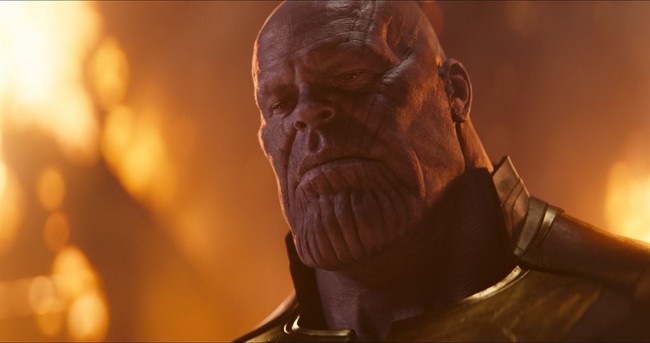
Two of Hollywood’s great sci-fi villains from the last quarter century — Agent Smith from “The Matrix” and Marvel’s Thanos — both believed that the success of their evil schemes was inevitable. “You hear that, Mr. Anderson?” Agent Smith (Hugo Weaving) asked in the first (and only) Matrix movie as he pinned his opponent in front of an oncoming subway train. “That is the sound of inevitability… It is the sound of your death… Goodbye, Mr. Anderson.”
He spoke those words just as Anderson (Keanu Reeves) fully blossomed into Neo, the hero he was meant to be, dodged the train, and delivered an epic a**-whooping to Agent Smith.
At the climax of “Avengers: Endgame,” all Thanos (CGI Josh Brolin) had to do to destroy and recreate the Universe in his own twisted image was snap his fingers while wearing his Magic Rock MacGuffin Gauntlet. “I am… inevitable,” he said while snapping his fingers, only to find that Iron Man Tony Stark (Robert Downey Jr.) had made off with the magical stones so that he could snap Thanos away — at the cost of his own life.
We need to talk about the word “inevitability” because when it comes to electric vehicles, I do not think it means what supporters think it means.
“Electric vehicles were supposed to be inevitable,” Paris Marx wrote for Business Insider on Wednesday in an unintentionally funny article. The first part is also entertainingly unconcerned with just how blithely wrong its assumptions are.
This, according to Marx, is what inevitability looks like:
Two years ago President Joe Biden climbed behind the wheel of a beefy white electric Hummer to tout his plan to make half of all new cars sold electric by 2030. The following year Congress passed the Inflation Reduction Act, which created a bevy of incentives for drivers to buy electric and for automakers to invest in EVs. That set off a flurry of new projects: EV plants, battery-manufacturing facilities, and mining operations began popping up.
Inevitability, you see, is when government spends money we don’t have and passes laws that won’t work to bribe or force people into buying cars they don’t want.
Easy-peasey! Or as Marx put it for Business Insider in one of several dumbfoundingly unself-aware lines, “The transition to an all-EV future seemed like a slam dunk.” Yes, and a Rube Goldberg drawing is a model of elegant simplicity.
The transition from horses to cars became inevitable just as soon as the internal combustion engine was invented. A car you could park almost anywhere and fill up maybe once a week so that you could travel at then-blistering speeds of 20 miles per hour was so obviously superior to a slow-moving horse that lived in a barn and left horse manure everywhere that not one subsidy, tax break, or mandate was ever required.
The case for transitioning from gas-powered cars to electric cars isn’t nearly so clear. Both power trains have their plusses and minuses, and, for most people, the minuses of EVs outweigh the plusses. If they didn’t, none of the subsidies, tax breaks, or mandates would be required. That’s what inevitability looks like.
Nevertheless, a coalition of kleptocrats, grifters, and liars was able to convince enough well-meaning fools that the transition to EVs was as inevitable as the move from horses to gas-powered cars.
They’re saving the planet, you see.
All we had to do to make that happen was… basically everything. That includes Washington creating an EV market from scratch to adding trillions in new debt to the mountain of it we’re already sitting on.
Here is what Marx and others have belatedly discovered. “The entire myth at the heart of this whole transition is that the battery car seamlessly fits right into the gas car’s position,” Edward Niedermeyer, the author of “Ludicrous: The Unvarnished Story of Tesla Motors,” told Marx. “It doesn’t, and that’s the problem.”
No horse manure, Sherlock?
As you’re probably already aware, “the pace of adoption has markedly slowed, and analysts have suggested the country is no longer on track to hit the government’s sales targets” and “the trickle-down effects of this decreased demand are everywhere.“
That is not the sound of inevitability, Mr. Marx.
The subsidies, tax breaks, and mandates were the magical stones. The finger-snapping villain was Presidentish Joe Biden. We were supposed to believe — and millions did and do — that the entire transportation sector of the world’s largest economy could be remade in a near-instant if the Big Man with the MacGuffin Gauntlet just wished for it hard enough.
Unbelievers like the rest of us would inevitably (there’s that word again) get swept aside by the oncoming train.
An electric train, of course. Preferably high-speed.
Recommended: A Murder in Our Family
On a personal note, the outpouring of support after the news of my niece’s death has been overwhelming. My entire family is blessed by both my coworkers and my readers. If it were possible to thank each of you individually and adequately, I would. Since that’s simply not possible, I hope these few words of thanks will suffice.











